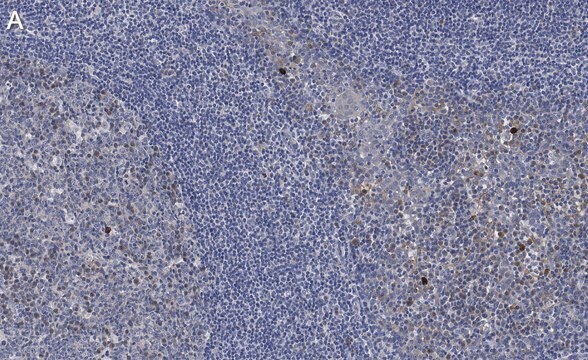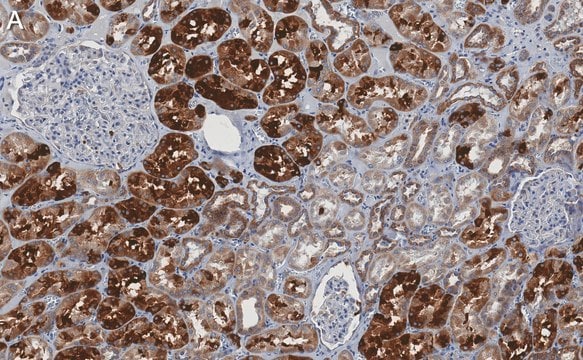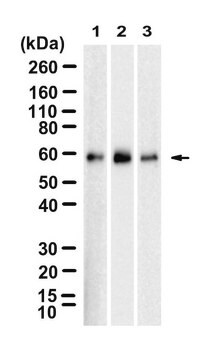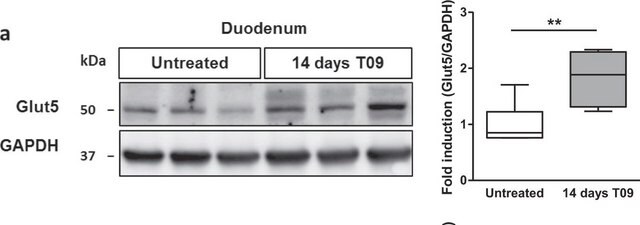General description
We are committed to bringing you greener alternative products, which adhere to one or more of The 12 Principles of Green Chemistry. This antibody is Preservative-free, produced without the harm or sacrifice of animals and exceptionally stable to allow for ambient shipping and storage if needed and thus aligns with "Waste Prevention", "Designing Safer Chemicals" and "Design for Energy Efficiency".
Click here for more information.
ZooMAb® antibodies represent an entirely new generation of recombinant monoclonal antibodies. Each ZooMAb® antibody is manufactured using our proprietary recombinant expression system, purified to homogeneity, and precisely dispensed to produce robust and highly reproducible lot-to-lot consistency. Only top-performing clones are released for use by researchers. Each antibody is validated for high specificity and affinity across multiple applications, including its most commonly used application. ZooMAb® antibodies are reliably available and ready to ship when you need them.
Specificity
Clone 1C7 is a ZooMAb® rabbit recombinant monoclonal antibody that specifically detects Apaf-1. It targets an epitope within 25 amino acids from the C-terminal region.
Immunogen
KLH-conjugated linear peptide corresponding to 25 amino acids from the C-terminal region of human Apoptotic protease-activating factor 1 (Apaf-1).
Application
Quality Control Testing
Evaluated by Western Blotting in Jurkat cell lysate.
Western Blotting Analysis (WB): A 1:1,000 dilution of this antibody detected Apaf-1 in Jurkat cell lysate.
Tested Applications
Western Blotting Analysis: A 1:10,000 dilution from a representative lot detected recombinant fragment of Human Apaf-1.
Immunocytochemistry Analysis: A 1:100 dilution from a representative lot detected Apaf-1 in THP-1 cells.
Affinity Binding Assay: A representative lot of this antibody bound Apaf-1 peptide with a KD of 3.7 x 10-7 in an affinity binding assay.
Enzyme Immunoassay (ELISA) Analysis: A serial of dilutions from a representative lot detected recombinant Human Apaf-1.
Note: Actual optimal working dilutions must be determined by end user as specimens, and experimental conditions may vary with the end user.
Target description
Apoptotic protease-activating factor 1 (UniProt: O14727; also known as Apaf-1) is encoded by the Apaf1 (also known as KIAA0413) gene (Gene ID: 317) in human. Apaf-1 is a ubiquitously distributed protein that plays a role in intrinsic apoptotic cell death. Apaf-1 contains a caspase recruitment domain (aa 1-90), an ATPase domain (NB-ARC)(aa 104-415), few short helical domains, and several copies of the WD40 repeat domains. Its highest expression is observed in the adult spleen and peripheral blood leukocytes, and in fetal brain, kidney and lung. Isoform 1 is expressed in heart, kidney, and liver. Under basal conditions it is a monomeric protein, but oligomerizes under apoptotic conditions. The monomeric form is auto-inhibited in a closed conformation through a bound ADP at the nucleotide binding site. Under apoptosis signals ADP is exchanged for ATP and its binding to cytochrome c triggers a conformation change where WD repeat region swings out, which allows the NB-ARC domain to rotate and expose the contact areas for oligomerization. Oligomeric form is a heptameric ring that binds to cytochrome c, pro-caspase-9, and ATP to form apoptosome. Oligomeric Apaf-1 mediates the cytochrome c-dependent autocatalytic activation of pro-caspase-9 to mature caspase-9, which then activates effector caspases 3, 6, and 7. Since Apaf-1 does not have any caspase activity, pro-caspase-9 is believed to be activated through autocatalysis in the apoptosome. Thus, cytochrome c release from the mitochondria is considered as a key signal that initiates the irreversible events in cell death. This ZooMAb® recombinant monoclonal antibody, generated by our propriety technology, offers significantly enhanced specificity, affinity, reproducibility, and stability over conventional monoclonals. (Ref.: Hu, Y., et al. (1999). EMBO J. 18(13); 3586-3595; Saleh, A., et al. (1999). J. Biol. Chem. 274(25); 17941-17945).
Physical form
Purified recombinant rabbit monoclonal antibody IgG, lyophilized in PBS, 5% Trehalose, normal appearance a coarse or translucent resin. The PBS/trehalose components in the ZooMAb formulation can have the appearance of a semi-solid (bead like gel) after lyophilization. This is a normal phenomenon. Please follow the recommended reconstitution procedure in the data sheet to dissolve the semi-solid, bead-like, gel-appearing material. The resulting antibody solution is completely stable and functional as proven by full functional testing. Contains no biocide or preservatives, such as azide, or any animal by-products. Larger pack sizes provided as multiples of 25 µL.
Reconstitution
300 µg/mL after reconstitution at 25 µL per vial. Please refer to guidance on suggested starting dilutions and/or titers per application and sample type.
Storage and Stability
Recommend storage of lyophilized product at 2-8°C; Before reconstitution, micro-centrifuge vials briefly to spin down material to bottom of the vial; Reconstitute each vial by adding 25 µL of filtered lab grade water or PBS; Reconstituted antibodies can be stored at 2-8°C, or -20°C for long term storage. Avoid repeated freeze-thaws.
Other Notes
Concentration: Please refer to the Certificate of Analysis for the lot-specific concentration.
Legal Information
ZooMAb is a registered trademark of Merck KGaA, Darmstadt, Germany
Disclaimer
Unless otherwise stated in our catalog or other company documentation accompanying the product(s), our products are intended for research use only and are not to be used for any other purpose, which includes but is not limited to, unauthorized commercial uses, in vitro diagnostic uses, ex vivo or in vivo therapeutic uses or any type of consumption or application to humans or animals.










